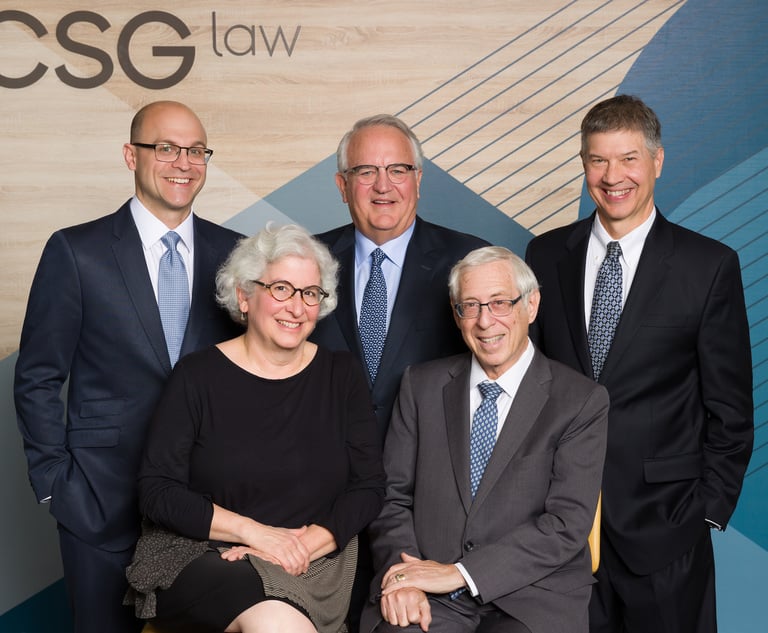 Credit: Rrraum/Shutterstock.com
Credit: Rrraum/Shutterstock.comLocal Ordinances Charging Fees to Landlords Upheld by Appellate Division
In Cona v. Township of Washington, the Appellate Division panel on Wednesday distinguished the challenged ordinances from another local measure—overturned in a 2015 Appellate Division ruling, Timber Glen Phase III v. Township of Hamilton—that required licensing of landlords.
August 29, 2018 at 05:36 PM
4 minute read
A New Jersey appeals court has rejected a challenge to numerous local laws imposing fees on landlords, finding that the ordinances were not enacted merely to generate revenue.
In Cona v. Township of Washington, the Appellate Division panel on Wednesday distinguished the challenged ordinances from another local measure—overturned in a 2015 Appellate Division ruling, Timber Glen Phase III v. Township of Hamilton—that required licensing of landlords. In that case, the municipality's imposition of a $100 annual license fee on landlords, in addition to fees for habitability inspections, was deemed ultra vires and unenforceable.
In three consolidated cases that were the subject of the Cona appeal, the plaintiffs claimed that the defendant municipalities, all in Gloucester County, violated the New Jersey Civil Rights Act by enacting the ordinances at issue.
The plaintiffs' suits were dismissed by two Superior Court judges in Gloucester County: Judge David Morgan dismissed suits filed by Christopher Cona against Washington Township, and by William Brody and Kathleen O'Hara against Woodbury, Westville, Glassboro, National Park and Deptford. Judge Jean McMaster dismissed a suit filed by Sharon Downs against Paulsboro.
On appeal, Appellate Division Judges Marie Simonelli, Michael Haas and Garry Rothstadt affirmed the judges below, finding that the challenged ordinances are reasonably related to municipalities' regulatory powers, as authorized by statute, and were distinguishable from the revenue-generation purpose that was invalidated in Timber Glen.
Rothstadt, writing for the court in a published opinion, said fees charged by the challenged ordinances were reasonably related to municipalities' exercise of their obligation to promote the safety and welfare of their residents.
Rothstadt was also on the panel that issued the Timber Glen ruling.
But, the Cona panel said, continued use of the term “license fees” by some municipalities in their ordinances “flies in the face of Timber Glen and causes considerable confusion.”
The panel remanded the cases to McMaster and Morgan for entry of an order directing the defendant municipalities to “strike the reference to their fees as license fees and changing the designation of any requirement for registration or inspection from being part of a licensing requirement.”
In Timber Glen, the defendant municipality claimed authority under the Licensing Act to impose its licensing fee. In that case, the Appellate Division said the powers to regulate and to license, although related, are discrete. The panel said in that case that the power to regulate did not encompass the power to require a license and payment of a fee, and that a 1998 amendment to the Licensing Act prohibited the licensing of rental units that are rented for 175 days or more.
The challengers in Wednesday's decision were represented by Woodbury attorney Lewis Adler. He did not respond to a request for comment about the ruling.
Gary Marek of Timothy Scaffidi's office in Woodbury, who represented Westville and Glassboro on appeal, said many municipalities used the terms “license” and “regulation” interchangeably, although the municipalities he represented changed the language of their ordinances after the Timber Glen ruling. Marek added, “We felt it was important that municipalities have the right to regulate rental properties and were able to go in and do inspections and make sure the properties meet safety and health requirements.”
Brian Shotts of Grace Marmero & Associates in Woodbury, who represented Washington and Deptford, said that after Timber Glen, “there was some confusion about what that case actually meant.” Guidance came in a 2016 unpublished Appellate Division case, State v. Mill Village Apartments, and the latest case provides guidance in the form of a published decision.
James Pierson of Angelini Viniar & Freedman in Woodbury, who represented Woodbury, said, “A lot of these ordinances were written many years ago, before the issue arose, and may have used the word 'license,' when in reality it was more of a regulation issue.”
M. James Maley of Maley Givens In Collingswood, representing Paulsboro, said the appellants in Cona made no credible allegations that the fees charged were unreasonable, and the court refused to allow a “fishing expedition” to evaluate if the amounts charged were reasonable.
Walter Kawalec III of Marshall Dennehey Warner Coleman & Goggin in Mount Laurel, representing the Borough of National Park, said he was not authorized by his client to comment.
This content has been archived. It is available through our partners, LexisNexis® and Bloomberg Law.
To view this content, please continue to their sites.
Not a Lexis Subscriber?
Subscribe Now
Not a Bloomberg Law Subscriber?
Subscribe Now
NOT FOR REPRINT
© 2024 ALM Global, LLC, All Rights Reserved. Request academic re-use from www.copyright.com. All other uses, submit a request to [email protected]. For more information visit Asset & Logo Licensing.
You Might Like
View All
Hit by Mail Truck: Man Agrees to $1.85M Settlement for Spinal Injuries

Appellate Div. Follows Fed Reasoning on Recusal for Legislator-Turned-Judge
4 minute read
Chiesa Shahinian Bolsters Corporate Practice With 5 From Newark Boutique
5 minute read
On the Move and After Hours: Brach Eichler; Cooper Levenson; Marshall Dennehey; Archer; Sills Cummis
7 minute readTrending Stories
Who Got The Work
Michael G. Bongiorno, Andrew Scott Dulberg and Elizabeth E. Driscoll from Wilmer Cutler Pickering Hale and Dorr have stepped in to represent Symbotic Inc., an A.I.-enabled technology platform that focuses on increasing supply chain efficiency, and other defendants in a pending shareholder derivative lawsuit. The case, filed Oct. 2 in Massachusetts District Court by the Brown Law Firm on behalf of Stephen Austen, accuses certain officers and directors of misleading investors in regard to Symbotic's potential for margin growth by failing to disclose that the company was not equipped to timely deploy its systems or manage expenses through project delays. The case, assigned to U.S. District Judge Nathaniel M. Gorton, is 1:24-cv-12522, Austen v. Cohen et al.
Who Got The Work
Edmund Polubinski and Marie Killmond of Davis Polk & Wardwell have entered appearances for data platform software development company MongoDB and other defendants in a pending shareholder derivative lawsuit. The action, filed Oct. 7 in New York Southern District Court by the Brown Law Firm, accuses the company's directors and/or officers of falsely expressing confidence in the company’s restructuring of its sales incentive plan and downplaying the severity of decreases in its upfront commitments. The case is 1:24-cv-07594, Roy v. Ittycheria et al.
Who Got The Work
Amy O. Bruchs and Kurt F. Ellison of Michael Best & Friedrich have entered appearances for Epic Systems Corp. in a pending employment discrimination lawsuit. The suit was filed Sept. 7 in Wisconsin Western District Court by Levine Eisberner LLC and Siri & Glimstad on behalf of a project manager who claims that he was wrongfully terminated after applying for a religious exemption to the defendant's COVID-19 vaccine mandate. The case, assigned to U.S. Magistrate Judge Anita Marie Boor, is 3:24-cv-00630, Secker, Nathan v. Epic Systems Corporation.
Who Got The Work
David X. Sullivan, Thomas J. Finn and Gregory A. Hall from McCarter & English have entered appearances for Sunrun Installation Services in a pending civil rights lawsuit. The complaint was filed Sept. 4 in Connecticut District Court by attorney Robert M. Berke on behalf of former employee George Edward Steins, who was arrested and charged with employing an unregistered home improvement salesperson. The complaint alleges that had Sunrun informed the Connecticut Department of Consumer Protection that the plaintiff's employment had ended in 2017 and that he no longer held Sunrun's home improvement contractor license, he would not have been hit with charges, which were dismissed in May 2024. The case, assigned to U.S. District Judge Jeffrey A. Meyer, is 3:24-cv-01423, Steins v. Sunrun, Inc. et al.
Who Got The Work
Greenberg Traurig shareholder Joshua L. Raskin has entered an appearance for boohoo.com UK Ltd. in a pending patent infringement lawsuit. The suit, filed Sept. 3 in Texas Eastern District Court by Rozier Hardt McDonough on behalf of Alto Dynamics, asserts five patents related to an online shopping platform. The case, assigned to U.S. District Judge Rodney Gilstrap, is 2:24-cv-00719, Alto Dynamics, LLC v. boohoo.com UK Limited.
Featured Firms
Law Offices of Gary Martin Hays & Associates, P.C.
(470) 294-1674
Law Offices of Mark E. Salomone
(857) 444-6468
Smith & Hassler
(713) 739-1250






